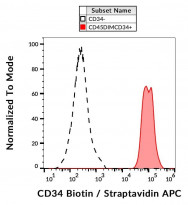ARG62819
anti-CD34 antibody [4H11 (APG)] (Biotin)
anti-CD34 antibody [4H11 (APG)] (Biotin) for Flow cytometry and Human
Cancer antibody; Cell Biology and Cellular Response antibody; Controls and Markers antibody; Developmental Biology antibody; Immune System antibody; Neuroscience antibody; Pro-B Cell Marker antibody; Endothelial Cell Marker antibody; Angiogenesis Study antibody
Overview
| Product Description | Biotin-conjugated Mouse Monoclonal antibody [4H11 (APG)] recognizes CD34 |
|---|---|
| Tested Reactivity | Hu |
| Tested Application | FACS |
| Specificity | The clone 4H11(APG) reacts with Class III epitope on CD34 (Mucosialin), a 110-115 kDa monomeric transmembrane phosphoglycoprotein expressed on hematopoietic progenitors cells and on the most pluripotential stem cells; it is gradually lost on progenitor cells. 4H11(APG) completely blocks binding of Class II antibody QBEnd10 and Class III antibodies BIRMA K3 and 8G12 on KG1a cell line. HLDA VI; WS Code M MA58 |
| Host | Mouse |
| Clonality | Monoclonal |
| Clone | 4H11 (APG) |
| Isotype | IgG1 |
| Target Name | CD34 |
| Antigen Species | Human |
| Immunogen | Permanent human cell line derived from peripheral leucocytes of a patient suffering from chronic myeloid leukaemia. |
| Conjugation | Biotin |
| Alternate Names | Hematopoietic progenitor cell antigen CD34; CD antigen CD34 |
Application Instructions
| Application Suggestion |
|
||||
|---|---|---|---|---|---|
| Application Note | * The dilutions indicate recommended starting dilutions and the optimal dilutions or concentrations should be determined by the scientist. |
Properties
| Form | Liquid |
|---|---|
| Purification Note | The purified antibody is conjugated with Biotin-LC-NHS under optimum conditions. The reagent is free of unconjugated biotin. |
| Buffer | PBS (pH 7.4) and 15 mM Sodium azide |
| Preservative | 15 mM Sodium azide |
| Concentration | 1 mg/ml |
| Storage Instruction | Aliquot and store in the dark at 2-8°C. Keep protected from prolonged exposure to light. Avoid repeated freeze/thaw cycles. Suggest spin the vial prior to opening. The antibody solution should be gently mixed before use. |
| Note | For laboratory research only, not for drug, diagnostic or other use. |
Bioinformation
| Database Links |
Swiss-port # P28906 Human Hematopoietic progenitor cell antigen CD34 |
|---|---|
| Gene Symbol | CD34 |
| Gene Full Name | CD34 molecule |
| Background | CD34 protein may play a role in the attachment of stem cells to the bone marrow extracellular matrix or to stromal cells. This single-pass membrane protein is highly glycosylated and phosphorylated by protein kinase C. Two transcript variants encoding different isoforms have been found for this gene. [provided by RefSeq, Aug 2011] |
| Function | CD34 is a possible adhesion molecule with a role in early hematopoiesis by mediating the attachment of stem cells to the bone marrow extracellular matrix or directly to stromal cells. Could act as a scaffold for the attachment of lineage specific glycans, allowing stem cells to bind to lectins expressed by stromal cells or other marrow components. Presents carbohydrate ligands to selectins. [UniProt] |
| Research Area | Cancer antibody; Cell Biology and Cellular Response antibody; Controls and Markers antibody; Developmental Biology antibody; Immune System antibody; Neuroscience antibody; Pro-B Cell Marker antibody; Endothelial Cell Marker antibody; Angiogenesis Study antibody |
| Calculated MW | 41 kDa |
| PTM | Highly glycosylated. Phosphorylated on serine residues by PKC. |
Images (1) Click the Picture to Zoom In








